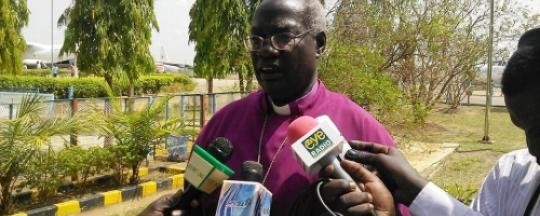The national peace and reconciliation committee headed by Archbishop Daniel Deng Bol is known to only about one in three South Sudanese, according to a newly released survey.
South Sudan's Committee on National Peace, Healing and Reconciliation (CNHPR) was established by presidential decree in April 2013.
In a survey funded by the UN Development Programme, respondents were asked “What peace processes are you familiar with?” They were able to select multiple responses, including the IGAD process, CNHPR, the Arusha process, and others.
36% of respondents, or about one third, said that they were familiar with CNHPR.
This result comes from a sample of 1,525 respondents surveyed in 11 locations including Juba, Terekeka, Nimule, Mvolo, Bor, Abyei and elsewhere.
Fewer respondents (30%) were familiar with the National Platform for Peace and Reconciliation, an umbrella of three government-linked and church-linked groups that includes CNHPR.
South Sudan Law Society, which carried out the survey, commented in a final report that the CNHPR has struggled to develop a reputation for neutrality. The researchers referred to the political context in which CNHPR was founded, noting that it came immediately after the removal of Vice President Riek Machar from the leadership of an earlier National Reconciliation Committee.
“On 15 April 2013, President Kiir issued a decree temporarily suspending the Vice President’s reconciliation initiative and dissolving the National Reconciliation Committee. One week later, on 22 April 2013, Kiir issued a decree establishing a Committee on National Healing, Peace and Reconciliation (CNHPR).”
“Although the decree states that, ‘[t]he Committee shall be an independent body which shall not be subject to control and direction from anybody or any institution,’ the politics surrounding the establishment of the CNHPR led some observers to question its ability to oversee an independent and inclusive national reconciliation effort.”
The report concludes: “Given these concerns, and in an effort to better coordinate the activities of actors working on reconciliation initiatives, in 2014 the CNHPR, Peace Commission and Specialised Committee on Peace and Reconciliation in the National Legislative Assembly came together to form the National Platform for Peace and Reconciliation (NPPR). Despite these changes, perceptions of partisanship remain.”
Under the terms of South Sudan's new peace deal, CNHPR will hand over documentation on its work to a national truth commission, which shall include nominees of the African Union. The commission has not yet been established.




